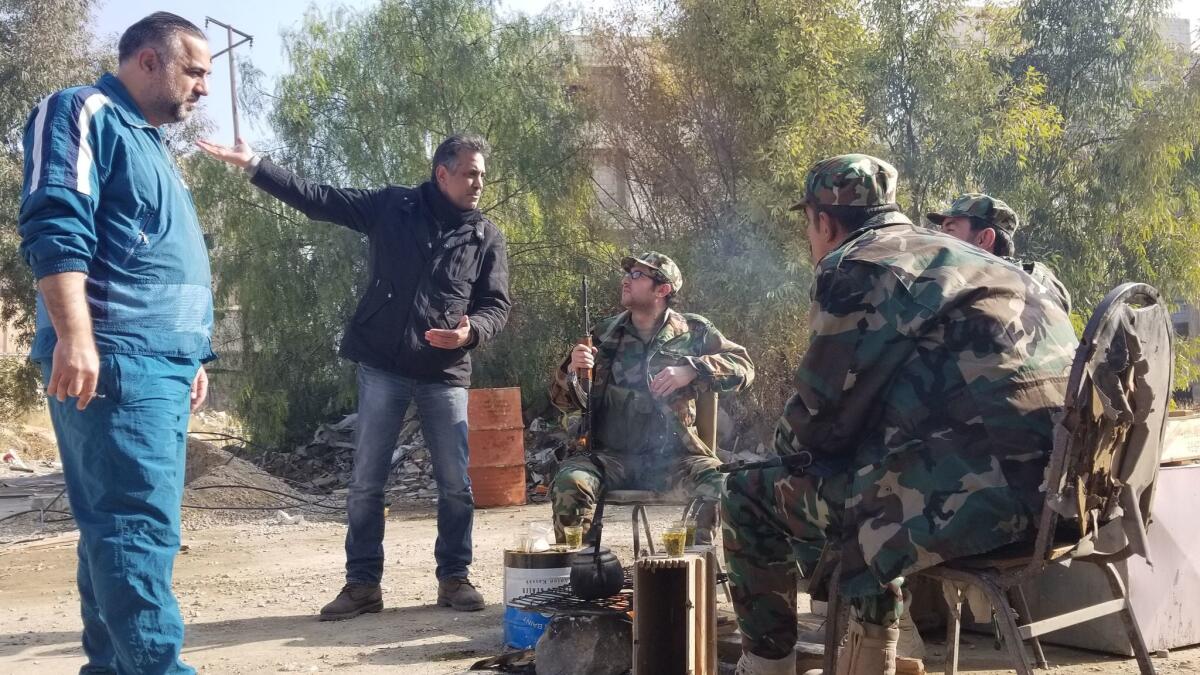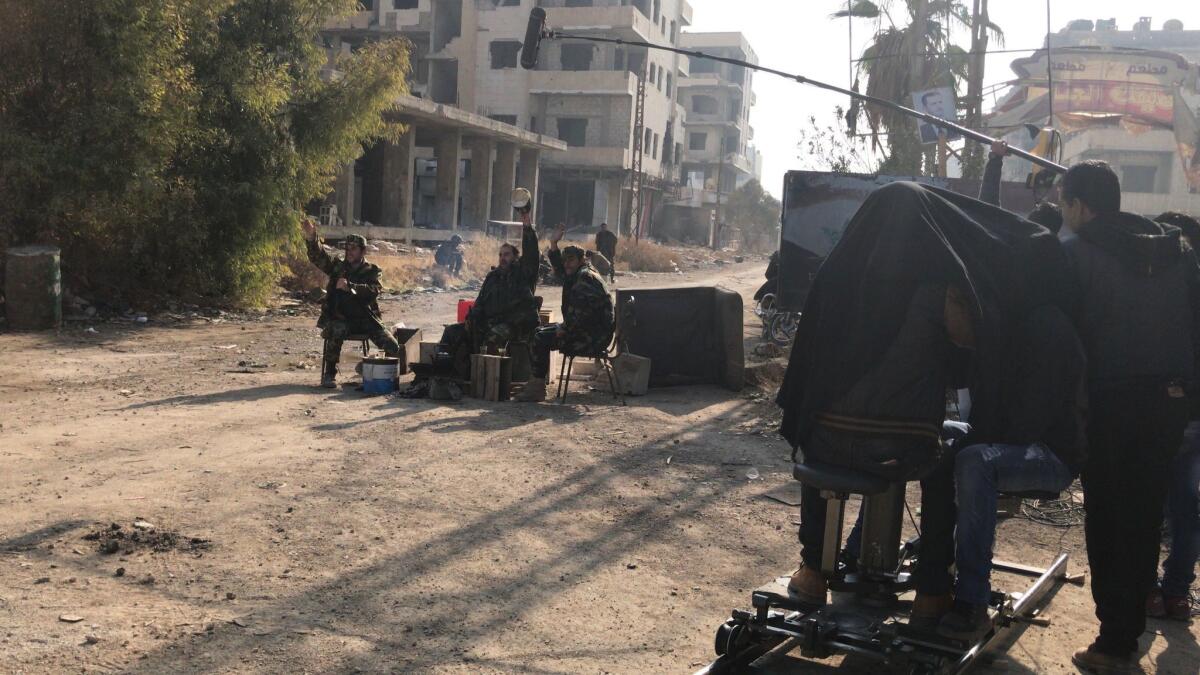In a new crop of television dramas, Syria confronts its civil war

- Share via
Reporting from Daraya, Syria — The Syrian soldier sprinted past the pulverized buildings, swerving at a rubble-strewn roundabout before coming to a stop at the entrance of an abandoned shop. He saluted the officers huddled inside, struggling to catch his breath to speak.
“Sir, I need to —” he stammered.
For the record:
11:55 a.m. March 7, 2018This story incorrectly states that Rafi Wahbi helped launch “Bidoon Qayd.” He collaborated on the series, but it was launched by the Lebanese company Spring Entertainment.
A voice from the side yelled: “Cut!”
It was Aref Tawil, the 52-year-old director of a new Syrian television drama called “Rozanna.” The actors relaxed for a moment, then retook their positions.
“Let’s go through that line again,” Tawil said. “Yalla baba, let’s do this.”
The set of “Rozanna,” which tells the story of a Syrian soldier, can be difficult to distinguish from the actual war zone that surrounds it. The show was being shot that day in Daraya, a devastated suburb of Damascus standing in for the iconic city of Aleppo.
“Rozanna” is part of a new crop of Syrian-made dramas that, seven years into a civil war that’s claimed hundreds of thousands of lives, are helping revive a television industry that once dominated the Arab world — even as that industry grapples with how to portray the war.

In 2015, a total of 17 shows were in production in Syria. That number has almost doubled as security has improved in the government-held areas. And it doesn’t include Syrian-themed productions made by Syrians who left the country.
While television once skirted the war entirely or amounted to little more than propaganda, the new shows are more likely to address universal truths about the conflict and the absurdities of daily life amid so much violence.
In the years before the conflict, Syrian dramas known as musalsalat had come to dominate television channels throughout the Middle East, even edging out the Egyptian shows that had ruled for decades.
Production companies churned out dozens of 30-episode dramas, and the Middle East Broadcasting Center, Rotana and other Gulf powerhouses competed for exclusive broadcast rights. The bidding wars were especially intense for shows to air during the holy month of Ramadan, when feasting and watching television are the main activities.
In 2010, you could binge on 28 different Syrian series on 26 channels across the Arab world, according to the cultural website Discover Syria. No less than seven channels aired “Bab Al Hara” (The Neighborhood’s Gate), a hit show about a Damascus neighborhood at the turn of the 20th century.
But after the start of the civil war in 2011, the number of productions was instantly cut almost in half.
“The factory of the Syrian drama was the street, the old Damascene house. … Many of those locations were destroyed or had clashes nearby so you just couldn’t film,” said Rafi Wahbi, a director, scriptwriter and actor.
Celebrity actors and directors were soon embroiled in the same bitter clashes that divided their audiences, as gossip columns breathlessly reported on who supported the government and who sided with the rebels.
At least eight famous actors were targeted and killed, while others were effectively blacklisted because of their political leanings. Much of Syria’s top talent left for Egypt or Lebanon.
The shows that did get made often struggled to find takers as regional entertainment giants followed the lead of their governments and cut ties with Syria.
“It was part of the siege on the country in all fields,” said Maher Khouly, head of the state-owned General Establishment for Television and Radio Productions, in an interview at his office in Damascus. “Companies stopped buying our productions — especially if the series was made by Syrians who don’t agree with their politics.”
One company even dropped the word “Syria” from its name, opting for the more generic “Sama Al Fan,” which translates to “Sky of Art.”
In the early years of the war, plot lines rarely mentioned it. Companies instead focused on genres such as “Shamiyaat,” dramas depicting Damascus at the turn of the 19th century — a politically safe subject.
“We were raised as a generation with the idea of built-in censorship, even if there’s no censorship, because who knows what happens if you say something?” said Abeer Hariri, a Syrian actress now living in Cairo. “This was reflected in all fields, including the dramas, which were in denial and were saying that everything was fine.”
When the war eventually started showing up in dramas, two years into the crisis, it was usually to make a heavy-handed political point.
“Even ‘Bab Al Hara’ started incorporating plot lines about nationalism and loyalty to the government,” said Wahbi.
Khouly, the head of the state production company, said there is no requirement to speak about the war or to only show the government’s point of view. The script’s quality, he said, is the main driver of what gets made.
But Tawil, the director of Rozanna, is unapologetic about his staunch support for the government or the pro-government message running through the drama.
“You’re here in Daraya, an area that was with the militants and liberated by the Syrian Army,” he said as actors prepped for a scene near a bombed-out square. “You can’t ignore a seven-year war in the streets, inside houses. … No art can ignore this.”
He said his series, which he expects to be completed before the Ramadan season in May, will show how the army took back Aleppo in late 2016.
“The liberation of Aleppo was the start of the liberation of other areas of Syria,” he said.
“We want to show how society supported the army until those victories were achieved.”
His approach stands in contrast to that of Wahbi, who said that for the last five years he has been “obsessed in searching for something common among Syrians.”
“In civil wars, there’s this extreme polarization that makes both sides unable to hear each other. I wanted to look for what we agreed upon, at the very least,” said Wahbi, who left Syria in 2012 and now divides his time between Beirut and Madrid.
One product of that effort is “Bidoon Qayd” (Without Document), a web series he launched with Lebanese writer Bassem Breish and Lebanese director Amin Dora two months ago. Made in Lebanon, it already has 40 million views on YouTube.
The show consists of 29 episodes, each about three minutes long, and highlights the stories of three Syrians affected by the war: Karim, a private school teacher caught by police for sheltering an activist friend; Reem, an irrigation engineer who flees the country after uncovering a corruption ring that diverts water from farmers to developers; and Wafiq, a colonel in the state’s political security apparatus who refuses to cooperate with well-connected officials to falsify IDs.
The show is unflinching in its portrayal of the indignities and absurdities of daily life in wartime: the scrum of people trying to get various types of applications past bored officials, the elegant Damascus restaurants where the well-heeled come to make backdoor deals, the men rummaging through trash cans for food, and the shabby, bleak corridors of Syria’s notorious security services that are now a regular stop for so many.
At one point in the show, the character of Reem — played by Hariri — yearns to return to the prewar Syria she remembers: “I missed my house and land, and I’m tired of the daily difficulties of a life in a country not my own.”
That was a line that resonated with Hariri, who left Damascus for Cairo when she felt the quality of the shows meant she could no longer perform at her best.
“As a Syrian I felt what it meant to live in a country not your own,” she said. “But all the time my heart and feelings were in Syria. This is our pain now.”
The show wound up on the web rather than television because Wahbi doubted its portrayal of the security services — or its racy love scenes — would have passed muster with censors in the Arab world.
“Syrians have spent seven years paying a high price,” Wahbi said. “I don’t think the viewer is able to deal with any more lying. … The person wants to see the real story.”
He said the series had been discussed on Syrian state TV as well as Orient, a pro-opposition network station: “They’ve never agreed on anything except on this show. Part of its success is that Syrians feel it talks about human stories. It leaves it to the audience to choose their point of view, and not call this person a hero, a traitor.”
Actor Ajaj Salim, who lives in Damascus and traveled to Beirut for the shooting of “Bidoon Qayd,” said the show is the beginning of a much-needed shakeup in Syrian drama at a time when actors work for fees that “can barely buy them a sandwich.”
“He who loves his country should present issues this way,” he said in an interview in Damascus. “Most Syrian dramas weren’t able to do this, but if after seven years we can’t take a dose of courage in our works, then it’s a problem.”
Though the war destroyed his industry, Salim pointed to an artistic boom in post-WWII Europe as his hope for Syria.
“War is the worst thing man has ever invented, but it’s a furnace that shows one’s mettle,” he said.
“Two years ago we were drowning in the crisis … but you feel now that people are just waiting for the opportunity, for that spark.”
Bulos is a special correspondent.
Twitter: @nabihbulos
More to Read
Sign up for Essential California
The most important California stories and recommendations in your inbox every morning.
You may occasionally receive promotional content from the Los Angeles Times.














